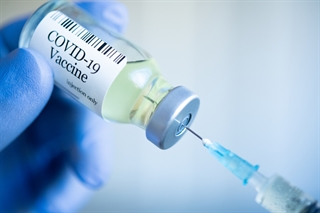MDS COVID-19 Vaccine Statement for Patients
A Special Note to all patients with Parkinson’s disease on COVID-19 Vaccination
Prepared by Stella Papa on behalf of the SIC, Chris Goetz and MDS leadership
The International Parkinson and Movement Disorder Society leadership and its Scientific Issues Committee (MDS-SIC) want to provide information regarding the COVID-19 vaccination opportunities that are paramount to the protection of our community of patients, physicians and associated health providers in the current critical situation of the global pandemic. In the last few days, COVID-19 vaccines have been approved in several countries for emergency use according to governmental immunization programs.
The recent FDA and EMA approval of vaccines BNT162b2 (Pfizer/BioNTech) and mRNA-1273 (Moderna) met the high standards required for use authorization after complete data scrutiny and validation, as required in the normal process of a vaccine approval. The process ensures that the efficacy and safety requirements have been met and people can be inoculated because the vaccine benefits outweigh its risks. Additional COVID-19 vaccines that are still in experimental phases II and III will eventually undergo the same scrutiny before emergency use authorization.
To date, the approved COVID-19 vaccines have proven to be highly effective preventing the severe and even the mild forms of the disease. High efficacy (>90%) has been proved regardless of race, gender, age, and medical conditions. Similar to other vaccines, there are some side effects with the recently approved COVID-19 vaccines that are considered of low significance. For the most part, side effects have been mild (pain and irritation at injection site, headache, low fever). In addition, reactogenicity (an immunologic reaction to vaccines) has been observed occasionally. Transparency in the development and approval process is very important. The efficacy and safety of the approved vaccines are fully disclosed in the published papers1, 2. It is highly recommended that all vaccines under development follow the same methodology with submission of the collected data for peer-reviewed publications for transparency to the scientific community informing the general public.
Vaccines with proven efficacy and satisfactory safety profile are now bringing hope to end the COVID-19 pandemic that has already taken many lives across the whole world. Indeed, a vaccine is our best medicine to fight this viral disease. Therefore, we highly recommend vaccination with properly authorized vaccines to prevent the risks of serious, life-threatening disease following COVID-19 infection. We also strongly recommend our community of patients to follow the indications of their personal doctors and health care providers. Finally, it is important to continue complying with the standard measures to reduce exposure and transmission of COVID-19 as recommended by WHO and CDC during and post vaccination.
For our Patients living with Parkinson’s Disease
To address aspects of COVID-19 vaccination particularly concerning our population of patients with Parkinson’s disease (PD), the available data indicate: 1. The approved mRNA-based vaccines and the vector vaccines under development induce immunization through mechanisms that do not interact with the neurodegenerative process in PD. With respect to the associated inflammation in the pathogenesis of PD as we understand it today, there is no evidence of any interaction with the immune response to these vaccines. 2. The reported Phase III data of the approved vaccines showed that the types or incidence of side effects in patients with PD have not been different than in the general population. 3. Similar to reactions to other immunizations, COVID-19 vaccination does not interfere with the current therapies of PD. 4. As some of our patients may be part of the first groups in the current vaccination programs because of their age, residency in nursing homes, or other reasons related to PD disabilities, more data will be available in the near future for further analysis of the impact of these vaccines on PD.
All considered, we have encouraged our community of health specialists to recommend COVID-19 vaccination to their patients with PD (or their responsible caregivers) unless there is a specific reason that precludes administration. We also recommend that patients come forward to seek the vaccine as quickly as it is available. The recommendation is given because benefits and risks are not different than in the general (age-matched) population and because we want our patients to be protected against the disease and its consequences. This conclusion can also be extended to patients with other movement disorders that have not shown differences in the reported vaccine data.
- Polack FP, Thomas SJ, Kitchin N, Absalon J, Gurtman A, Lockhart S, Perez JL, Pérez Marc G, Moreira ED, Zerbini C, Bailey R, Swanson KA, Roychoudhury S, Koury K, Li P, Kalina WV, Cooper D, Frenck RW Jr, Hammitt LL, Türeci Ö, Nell H, Schaefer A, Ünal S, Tresnan DB, Mather S, Dormitzer PR, Şahin U, Jansen KU, Gruber WC; C4591001 Clinical Trial Group. Safety and Efficacy of the BNT162b2 mRNA Covid-19 Vaccine. N Engl J Med. 2020 Dec 10. doi: 10.1056/NEJMoa2034577. Online ahead of print.PMID: 33301246
- Jackson LA, Anderson EJ, Rouphael NG, Roberts PC, Makhene M, Coler RN, McCullough MP, Chappell JD, Denison MR, Stevens LJ, Pruijssers AJ, McDermott A, Flach B, Doria-Rose NA, Corbett KS, Morabito KM, O'Dell S, Schmidt SD, Swanson PA 2nd, Padilla M, Mascola JR, Neuzil KM, Bennett H, Sun W, Peters E, Makowski M, Albert J, Cross K, Buchanan W, Pikaart-Tautges R, Ledgerwood JE, Graham BS, Beigel JH; mRNA-1273 Study Group. An mRNA Vaccine against SARS-CoV-2 - Preliminary Report. N Engl J Med. 2020 Nov 12;383(20):1920-1931. doi: 10.1056/NEJMoa2022483. Epub 2020 Jul 14.PMID: 32663912






